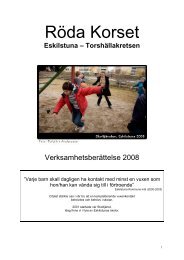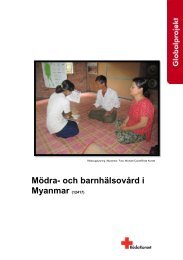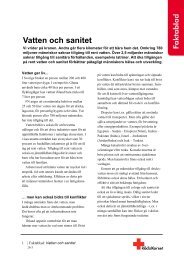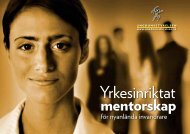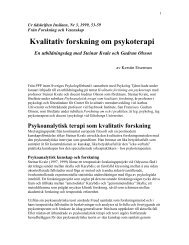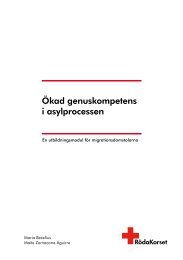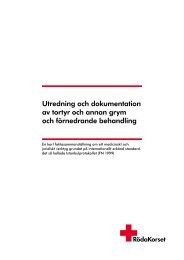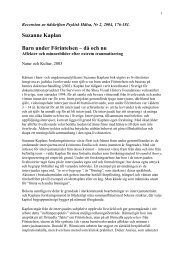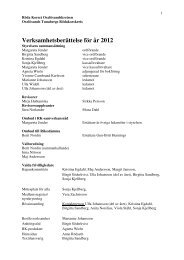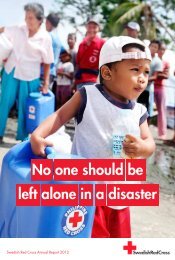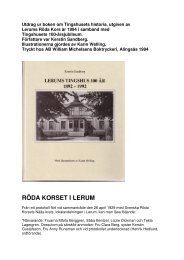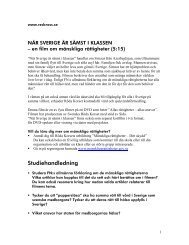chapter 4 - DRK
chapter 4 - DRK
chapter 4 - DRK
Create successful ePaper yourself
Turn your PDF publications into a flip-book with our unique Google optimized e-Paper software.
Strictly under embargo until Wednesday 22 September at 00:01 GMT (02:01 Geneva time)those affected, help them get organized, gather necessary data about the disaster siteand support them in showing their capabilities to local government. Where relocationis necessary, they help highlight the importance of being able to get land on suitable,well-located sites where access to income-earning opportunities is as importantas the site itself. The effectiveness of this is much enhanced if there are supportivelocal governments and national agencies. Obtaining, when necessary, land or title toBox 3.2 Inclusive equitable citiesShack/Slum Dwellers International seeks tobuild local movements at a neighbourhoodlevel, primarily around land and basic services.The network grew from the seven foundingmembers in 1996 (Cambodia, India, Namibia,Nepal, South Africa, Thailand and Zimbabwe)to 16 core affiliates in 2006 (Brazil, Ghana,Kenya, Malawi, Philippines, Sri Lanka, Tanzania,Uganda, Zambia) with links to ten morecountries by 2010 (Angola, Argentina, Bolivia,Egypt, Indonesia, Mozambique, Nigeria,Pakistan, Sierra Leone and Swaziland). SDI’smethodology encourages local communitiesto design housing solutions to address theirneeds, refining these solutions through practice.It also seeks, in general, to be non-confrontationalin its relations with local authoritieswith the understanding that city-wide solutionsto the problems of insecure tenure and lack ofaccess to services need to be in place.SDI affiliates have achieved significant successwith secure tenure in India, Kenya, Malawi,Namibia, Philippines, South Africa, Thailandand Zimbabwe. Local groups have negotiatedfor state subsidies to secure land and basic servicesfor over 150,000 families. Their experiencehighlights the importance of strong localorganizations if community solutions are to beallowed to prevail and if communities are to havethe capacities they need to take up new challengesonce they move to permanent sites andnew homes. In terms of disaster preparedness,there is an increasing awareness in SDI communitiesabout the work required with local authoritiesand local NGOs to minimize disaster-related risk.The interest of tenants and those who claimto ‘own’ land may differ considerably. The exceptionsare notable because they are rare.SDI’s Kenyan affiliate, the Kenyan People’sHomeless Federation, supported by localNGOs, worked with local savings schemes inHuruma, one of Nairobi’s many informal settlements,to regularize the settlement. A communitysurvey had identified 1,105 tenants, 1,002structure owners (i.e., owners of the house butnot legal owners of the land) and 202 residentlandowners. The residents were unanimousin seeing security of their homes and land astheir biggest need. Hence, when the governmentsaid that they could have legal tenure ifthe residents could agree on a land-sharing arrangement,they negotiated to divide the land.The outcome was inclusive of all groups andoffered the owners sufficient land for them toaccept a compromise.Communities that come together to addresstheir need for tenure, infrastructure and ser vicesare more likely to be prepared in the eventof a disaster. As the risks of climate changeare increasingly recognized, more communitygroups want to educate themselves about therisks attached to their location both to preparethemselves and to negotiate for appropriate assistancefrom the authorities. World Disasters Report 2010 – Focus on urban risk59



